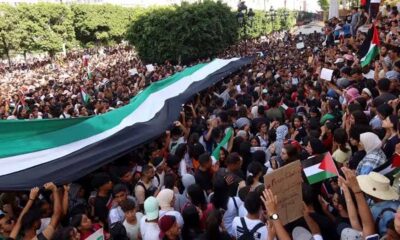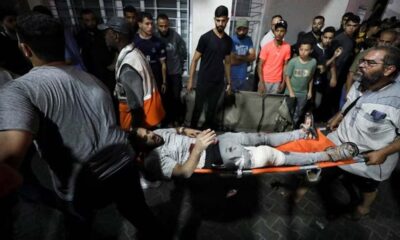International
Mass grave dug at Gaza hospital as humanitarian catastrophe grows
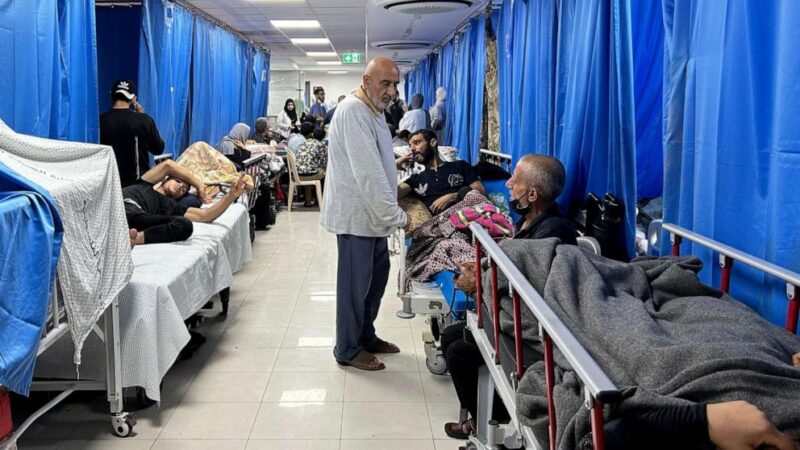
Mass grave dug at Gaza hospital as humanitarian catastrophe grows
The catastrophic humanitarian situation in the Gaza Strip grew worse on Tuesday as much of the focus remained on grim accounts about the state of the collapsed health system after almost six weeks of war between Israel and Gaza’s Hamas rulers.
UN Secretary General António Guterres said he was “deeply disturbed” by the perilous situation at Gaza’s hospitals and, “in the name of humanity,” called for a ceasefire.
Another dire warning came from the UN’s Palestinian relief agency, which said humanitarian operations were grinding to a halt due to the lack of fuel.
In northern Gaza, there was fierce fighting between Israeli soldiers and Palestinian militants around several hospitals.
Attacks on hospitals and a lack of fuel to generate electricity have claimed the lives of several patients in recent days, including newborn babies, according to Palestinian and UN officials.
Around 180 decomposing bodies on the grounds of al-Shifa, the largest hospital in the Gaza Strip, have begun to be buried in a mass grave in a courtyard, according to the Hamas-controlled Ministry of Health.
The account could not immediately be verified.
However, it accorded with descriptions of the situation by the UN’s Office for the Coordination of Humanitarian Affairs, which said on Monday it had heard of about 100 bodies that could not be buried at the hospital.
The World Health Organisation said on Tuesday that al-Shifa Hospital was still in operation, contrary to statements made by health officials at the weekend.
“We call it a functioning hospital because of the heroic efforts of the staff remaining,” WHO spokeswoman Margaret Harris said in Geneva on Tuesday.
Despite the lack of power and attacks, the staff at al-Shifa Hospital are trying everything they can to care for around 700 remaining seriously ill patients. Within the past 24 hours, 20 of those have died, Harris said, referring to figures from the local health authorities.
READ ALSO:
- Avoid political opinion, focus on responsibilities, Oshiomhole urges labour unions
- Barcelona begin European defence with one-sided win
- Telecom sector contributes 16% to Nigeria’s GDP – MTN
The WHO has its own staff in the north of the Gaza Strip, said Harris.
Like the remaining population, they were having problems getting the basic necessities of food and drink.
The al-Shifa Hospital is not only the largest in the Gaza Strip.
Before the recent Israeli attacks, it was also the best-equipped hospital with the most specialised doctors where the seriously ill patients were treated.
Evacuating them would have been difficult even under the best conditions without conflict in the streets, said Harris, but it was impossible in the chaos of the conflict.
In addition, there is no capacity in the south of the Gaza Strip to receive these patients.
“We are begging for a ceasefire,” Harris said.
Street fighting in Gaza City is also preventing emergency workers from responding to calls for help from people trapped under rubble after Israeli bombardments.
People who can no longer get out of their homes and those who need ambulances for the wounded often wait in vain, OCHA reported, citing the Palestinian Red Crescent.
Israel says Hamas is using medical facilities and civilians as “human shields,” with terrorists operating command centres in or under hospitals, including al-Shifa, making them legitimate targets.
On Monday, the Israeli Defense Forces (IDF) said Hamas weapons and explosives were found at al-Rantisi Children’s Hospital after the site was evacuated on Sunday.
Almost 1.6 million of the approximately 2.3 million inhabitants of the sealed-off Gaza Strip have been displaced since the start of the Israeli attacks on October 7.
Many have taken shelter in hospitals.
Israel’s offensive was prompted by massacres carried out by Hamas and other militants in Israel, which killed about 1,200 people.
READ ALSO:
- INEC debunks claims of tampering with Kogi poll results on IReV
- CBN extends validity of old N1000, N500, N200 notes indefinitely
- Nigerian mother of two found dead at home ‘after speaking to her husband, others on phone’
The groups also kidnapped around 240 people and took them to Gaza.
Three people were injured in Tel Aviv on Tuesday after militants in Gaza once again fired rockets at the city. The city was last targeted by rockets from the Palestinian territory on Friday.
The number of Palestinians killed in Gaza has risen to 11,500 since the start of the war on October 7, according to the Hamas-run Health Ministry in Gaza. Some 29,000 people have been injured.
The UN’s main agency in the Gaza Strip said late Tuesday that humanitarian operations were ending due to the lack of fuel.
Israel has not allowed fuel into the territory due to fears it could be used by Hamas fighters.
“The humanitarian response in the Gaza Strip, on which over two million people depend, is gradually coming to an end because no fuel has been allowed into the Gaza Strip since October 7,” UNRWA Commissioner-General Philippe Lazzarini said in a statement.
“It is very simple. Without fuel, the humanitarian operation in Gaza is coming to an end. Many more people will suffer and will likely die,” he said.
The push to free the hostages held by Hamas has made little progress.
The International Committee of the Red Cross said on Tuesday it still had not been granted access by Hamas to see them.
“We have been insisting to see the hostages,” spokeswoman Fatima Sator said in Geneva on Tuesday.
“It is part of our dialogue with Hamas,” she added.
Angry relatives and friends of the hostages are marching almost 70 kilometres from Tel Aviv to Jerusalem, where they are set to arrive on Sunday.
There, they are to march to the official residence of Prime Minister Benjamin Netanyahu, according to organisers.
Only four hostages have been released and one was freed in a military operation.
It is unclear how many of the others are still alive.
Mass grave dug at Gaza hospital as humanitarian catastrophe grows
dpa/NAN.
International
Israel seizes key Gaza border, launches assault on Rafah
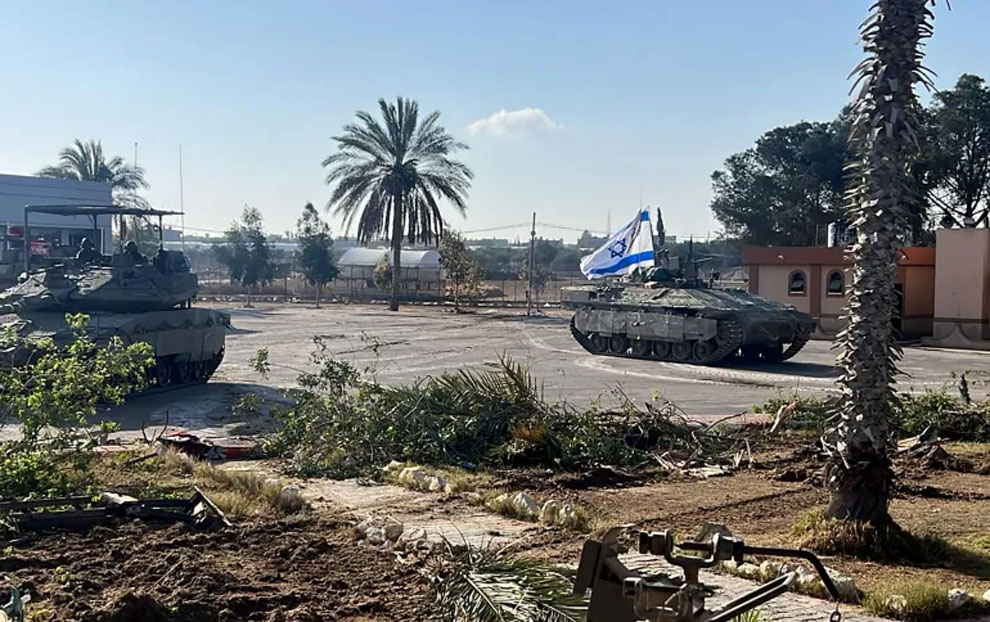
Israel seizes key Gaza border, launches assault on Rafah
Israeli forces have seized control of Gaza’s Rafah border crossing, cutting off a vital route for humanitarian aid and potential sanctuary for civilians from a building offensive.
The Israeli military said on Tuesday that it had seized “operational control” of the Gaza side of the border post, which links the besieged enclave with Egypt. The closure of the crucial passage and positioning of tanks in the centre of Rafah is seen as a demonstration of Israel’s determination to press on with an assault on the southern city despite ongoing truce talks.
The 401st Brigade entered the Rafah crossing early on Tuesday, the Israeli military said, closing a route vital for the aid entering Gaza and any civilians able to flee the fighting to Egypt.
The military claimed that the crossing was “being used for terrorist purposes”, alleging that Hamas’s mortar attack on Sunday on the Karem Abu Salem crossing, known as Kerem Shalom to Israelis, which remains closed, was launched from the vicinity. However, it has not so far provided evidence.
The operation came amid an overnight assault on eastern parts of the city. Warplanes pounded residential homes, killing at least 12 people.
Israel’s military said in a statement it had struck numerous Hamas targets in eastern Rafah, killing about 20 fighters.
A spokesman for the Palestinian Crossings Authority acknowledged to The Associated Press news agency that Israeli forces had seized the crossing and closed it for the time being.
READ ALSO:
- US, UK, most EU nations to boycott Putin inauguration
- Why Atiku is afraid of the coastal highway project success – Presidency
- Depressed Delta lady kills self over hardship
“It’s been a very difficult night,” reported Al Jazeera’s Hani Mahmoud from Rafah. “It’s been very violent, very bloody and full of destruction.”
The assault comes despite Hamas having said on Monday that it had agreed with the terms of a truce deal hammered out by mediators.
However, pressed by hardline nationalist coalition partners who have demanded a full offensive on Rafah, Israeli Prime Minister Benjamin Netanyahu appears set to press on regardless.
Trapped
Tareq Abu Azzoum reported from Rafah that the Israeli military carried out an incursion on the eastern side of Rafah, during which there was a heavy exchange of fire with Hamas fighters amid an intense bombing campaign, with the main objective of seizing control of the crossing.
The Israeli control of the border post “is devastating because … Palestinians will no longer be able to leave the territory”, he said.
Despite urgent warnings from its closest allies that an offensive on the city risks huge numbers of civilian casualties, Israel insists that its plans will allow it to clear Rafah and press on to attack the Hamas command and fighters there.
“The Rafah offensive has started again, in spite of all the requests of the international community, the US, the European Union member states, everybody asking Netanyahu not to attack,” Josep Borrell, the EU’s top diplomat, told journalists on Tuesday. “I am afraid that this is going to cause again a lot of casualties, civilian casualties. Whatever they say,” he said, adding, “there are no safe zones in Gaza.”
READ ALSO:
- CBN directs banks to start deducting cybersecurity levies from customers
- Olise scores twice as Crystal Palace trash Manchester United
- Many injured as Police teargas Delta protesters
Israeli forces whipped up panic on Monday as they ordered 1.4 million or so Palestinians in Rafah – most of whom are displaced following previous instructions from the Israeli military – to evacuate.
The Israeli army reiterated on Tuesday that it has “encouraged” displaced people and international humanitarian organisations operating in eastern Rafah to “temporarily evacuate”.
However, people sheltering in Rafah, amid poor conditions with little shelter, food, or medicine, have few places to go.
The closure of the border crossing only threatens to worsen those shortages and trap more people close to the fighting.
Sources from three humanitarian relief agencies told the Reuters news agency that aid shipments had been halted due to the closure of the crossing.
The latest Israeli operation sees them being pushed towards al-Mawasi on the coast, where the military says it has set up field hospitals, tents, and medical supplies.
“The Israeli military is … strategically cutting off the Gaza Strip and sealing it off from the region,” suggested Al Jazeera’s Mahmoud.
“With the Israeli military presence there right now, we can safely say that we’re looking at a very difficult situation in terms of getting humanitarian aid into Gaza,” he said.
“At the same time, when we look at the location of the Rafah crossing, at almost the centre of the city, that indicates that we’re very close to a full invasion of Rafah.”
Israel seizes key Gaza border, launches assault on Rafah
International
US, UK, most EU nations to boycott Putin inauguration

US, UK, most EU nations to boycott Putin inauguration
The United States and most European Union nations have said they will not send envoys to Tuesday’s inauguration of Vladimir Putin as Russian president.
Putin, 71, secured a fifth term in office in a March election that critics said lacked democratic legitimacy.
He gained 87.28 percent of the vote, weeks after the sudden death of his most vocal critic, Alexey Navalny, in an Arctic prison.
“We will not have a representative at his inauguration,” US State Department spokesperson Matthew Miller told reporters. “We certainly did not consider that election free and fair but he is the president of Russia and he is going to continue in that capacity.”
The United Kingdom and Canada said they would not send anyone to the ceremony, while a spokesperson for the European Union told the Reuters news agency the bloc’s ambassador to Russia would not attend the inauguration, in keeping with the position of most of the EU’s member states.
The three Baltic states – Estonia, Latvia and Lithuania – which have withdrawn their ambassadors from Moscow – ruled out attending the inauguration.
“We believe that the isolation of Russia, and especially of its criminal leader, must be continued,” Lithuania’s Foreign Minister Gabrielius Landsbergis said.
READ ALSO:
- Why Atiku is afraid of the coastal highway project success – Presidency
- Depressed Delta lady kills self over hardship
- CBN directs banks to start deducting cybersecurity levies from customers
“Participation in Putin’s inauguration is not acceptable for Lithuania. Our priority remains support for Ukraine and its people fighting against Russian aggression.”
The Czech Republic is also expected to snub the ceremony, while Germany’s Foreign Office said its representative would not attend – it earlier recalled its ambassador over alleged Russian cyberattacks.
An aide to Putin said the heads of all foreign diplomatic missions in Moscow including those from “unfriendly states” had been invited to attend the inauguration, which starts at noon (09:00 GMT) and will be broadcast live on Russian television.
Putin is due to arrive in a luxury motorcade – state-run RT reported modifications to his armoured Aurus limousine including improved sound insulation and all-round cameras – at the Grand Kremlin Palace. The one-time KGB spy will then walk through the palace corridors to the ornate Saint Andrew Hall, where he will take the presidential oath and make a brief address. He will also received a blessing from the patriarch of the Russian Orthodox Church.
The ceremony is taking place a day after Russia announced plans for a tactical nuclear weapons drill, blaming what it said were “provocative” moves by Western countries over Ukraine. Putin launched his full-scale invasion of Ukraine more than two years ago.
“Ukraine sees no legal grounds for recognising him as the democratically elected and legitimate president of the Russian Federation,” Ukraine’s Ministry of Foreign Affairs said in a statement.
Tuesday’s swearing-in ceremony, it said, sought to create “the illusion of legality for the nearly lifelong stay in power of a person who has turned the Russian Federation into an aggressor state and the ruling regime into a dictatorship”.
Despite the apparent boycotts, France, Hungary and Slovakia are all expected to send representatives to the ceremony, Reuters reported, citing unnamed diplomatic sources.
Speaking alongside China’s president on Monday, French President Emmanuel Macron said: “We are not at war with Russia or the Russian people, and we have no desire for regime change in Moscow.”
The source said France had previously condemned the context of repression in which the election was held, depriving voters of a real choice, as well as the organisation of elections in Ukrainian territories occupied by Russia, which France considers a violation of international law and the United Nations Charter.
Franco-Russian relations have deteriorated in recent months as Paris has increased its support for Ukraine.
Last week, Macron said it would be legitimate for France to send troops to Ukraine if Russia broke through the Ukrainian front lines and Kyiv requested assistance.
US, UK, most EU nations to boycott Putin inauguration
International
Chinese state linked to hacking of UK Defence Ministry
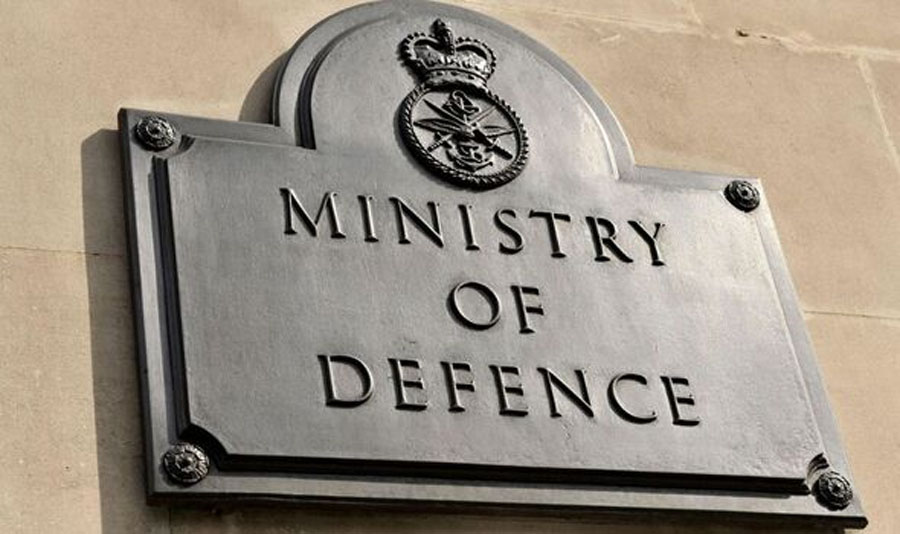
Chinese state linked to hacking of UK Defence Ministry
Sky News has learned of a significant data breach at the Ministry of Defence (MoD), with indications pointing towards state-sponsored hacking by China. The breach targeted service personnel, prompting concerns about national security and individual safety.
According to sources, the cyberattack, allegedly orchestrated by the Chinese state, targeted the MoD’s payroll system, compromising the personal information, including names and bank details, of both current service personnel and veterans. While all salaries for this month will be disbursed as planned, the breach raises serious concerns about the vulnerability of sensitive government systems.
Conservative MP Tobias Ellwood, a former soldier, expressed suspicions that China may exploit the financial vulnerability of affected individuals for coercive purposes. Defence Secretary Grant Shapps is expected to address the issue in Parliament, outlining measures to safeguard affected personnel and mitigate future risks.
READ ALSO:
- Terrorists attack Southern Kaduna again, kill six, injure eight
- Court rules against wife who sued husband for forced ‘unnatural sex’
- Netanyahu rubbishes Hamas ceasefire proposal
The MoD has moved swiftly to investigate the breach, assuring that no data appears to have been extracted thus far. However, the incident underscores the evolving nature of cyber threats and the imperative of bolstering national defenses in the digital realm.
The breach comes amid escalating tensions between the UK and China, with recent accusations of cyber aggression attributed to “state-affiliated actors.” Labour’s shadow defence secretary, John Healey, has called for a comprehensive response from the government, emphasizing the gravity of the breach and its implications for national security.
Conservative MP Sir Iain Duncan Smith echoed concerns about China’s systemic threat, calling for a recalibration of UK policy in response to Beijing’s hostile activities. The incident underscores the need for heightened vigilance and investment in cybersecurity infrastructure, as advanced warfare increasingly extends into the digital domain.
Chinese state linked to hacking of UK Defence Ministry
-

 metro3 days ago
metro3 days agoDSS seals Plateau clinic over patient’s death
-
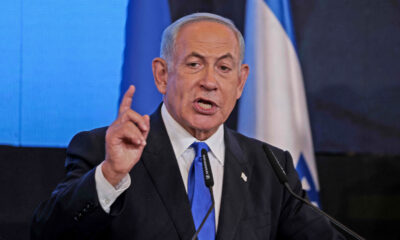
 International1 day ago
International1 day agoNetanyahu rubbishes Hamas ceasefire proposal
-

 metro3 days ago
metro3 days agoWe’ve arrested seven suspected cultists, armed robbers in Anambra – Police
-

 Politics3 days ago
Politics3 days agoPDP: Sule Lamido blames court for mass resignation from party
-

 News2 days ago
News2 days agoFubara: I have moved on with governance despite political pressure
-

 News1 day ago
News1 day agoNigerian varsity VC suspended over alleged gross misconduct
-

 Politics22 hours ago
Politics22 hours agoAbia deputy gov candidate, lawmaker dump PDP
-

 Africa3 days ago
Africa3 days agoFather mourns 14-year-old daughter poisoned at school, says ‘I’ve failed you my baby’

